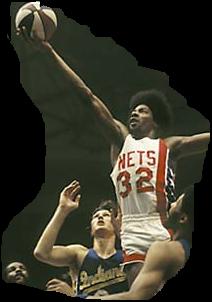Memories of the ABA

This season marks the 30th anniversary of the ABA-NBA merger. It was so significant that the 1976-77 season ought to be a demarcation point in NBA history -- Before The Merger and After The Merger.
In fact, I would argue that the ABA, while a failed venture in and of itself, essentially created the modern NBA. If you doubt it, just watch an NBA game played just prior to the merger, and then compare it to a game played just after the merger. Its like two wholly different monsters. The style, the talent level, and the excitement that the infusion of ABA talent pumped into the NBA clearly resuscitated professional basketball just prior to the dawn of Bird and Magic.
I bring all this up because I just finished, and want to recommend to you as basketball fans, the book "Loose Balls". It is an oral history of the American Basketball Association as told to author Terry "I am no longer a planet" Pluto. While I generally dislike it when authors use this form of storytelling, in this case the technique works. It gave me an almost "you are there" sensation for the wild ride that was the ABA. The almost amatuerish, ephemeral quality of that celebrated league makes for some extremely entertaining, and often comical, reading.
At times it is also educational. For instance, I always wondered why the Kentucky Colonels, a reasonably successful and popular ABA franchise, was left out of the merger. It turns out the NBA just didn't want them. I always assumed the ABA-NBA merger was similar in nature to the AFL-NFL merger. Not at all. At the time of the merger, the ABA was basically in the same position as the USFL, not the AFL. They had six ongoing franchises remaining, but for all intents and purposes, they were done. The only hope for the remaining six was to merge with the senior association. So they were basically "hat in hand" when it came to negotiating the terms of any merger. And the NBA knew it. And they played hardball, basically cherry picking the four franchises that appealed to them and telling the others to get lost. (Sort of like when that record producer told Greg Brady he would sign him to a deal as Johnny Bravo if he got rid of the rest of the Bradys). Not only that, they forced the already cash starved four to pay their way into the NBA. Brutal.
Anyway, long story short, the four wanted teams then had to negotiate a buyout with the two unwanted teams (the Colonels and the St. Louis Spirits). The shortsighted Colonels took a relatively small cash payout, while the Spirits owners, in one of the greatest negotiated settlements in sports history, took an 1/5 interest in all future TV money. Genius.


0 Comments:
Post a Comment
<< Home